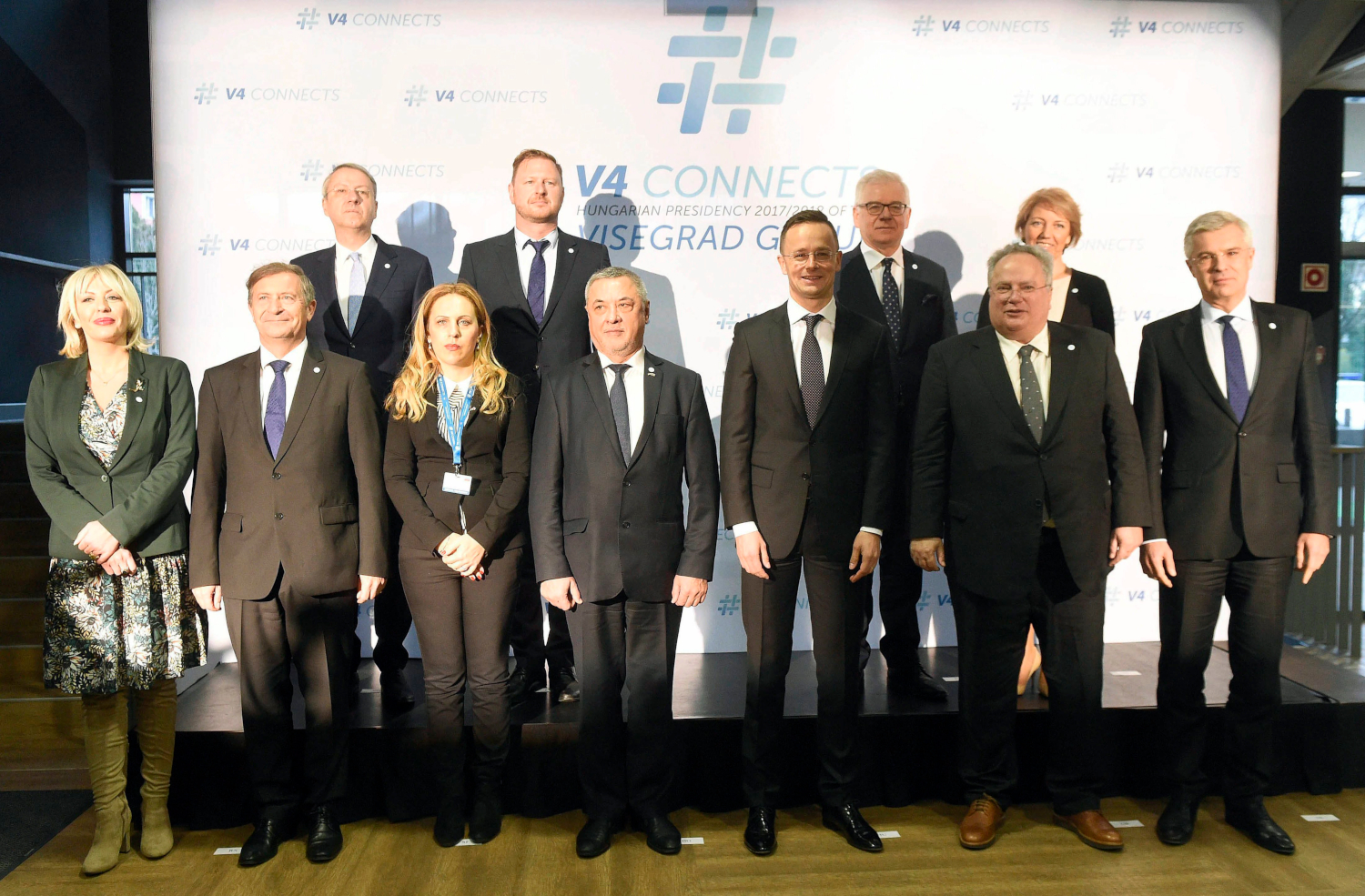THE WARSAW INSTITUTE REVIEW
Date: 13 January 2019 Author: Piotr Bajda
Western Balkans – a Somewhat Forgotten Place on the Map of Europe
In January 2019, Poland assumed an annual presidency of the Berlin Process – a regional cooperation model, initiated in 2014, to support the integration of the Western Balkan countries with the European Union. In the middle of 2019, Poland will host the next EU – Western Balkans Summit.
 Secretary of State at the Ministry of Foreign Affairs Szymon Szynkowski vel Sęk during a press conference at the headquarters of the Ministry of Foreign Affairs in Warsaw. © Tomasz Gzell (PAP)
Secretary of State at the Ministry of Foreign Affairs Szymon Szynkowski vel Sęk during a press conference at the headquarters of the Ministry of Foreign Affairs in Warsaw. © Tomasz Gzell (PAP)For Warsaw, the integration of the Western Balkans with the EU and the tasks related to its presidency in the Berlin Process is of big importance, as evidenced by Polish Prime Minister Mateusz Morawiecki appointing Szymon Szynkowski vel Sęk, the current Secretary of State of the Polish Ministry of Foreign Affairs to the position of Government Plenipotentiary for the Western Balkans on September 27, 2018, and assigning him the responsibility of presiding over the Polish annual presidency.
One of the results attributed to the end of the war in Fromer Yugoslavia following the intervention of NATO troops and the Dayton peace agreement in 1995, was that the Balkans stopped being a burning issue. For a long time, the Balkans have been treated more as a problem than an opportunity, which is why they have become a somewhat forgotten area from the perspective of the old member states of the European Union. The most modern parts of the Balkans were accepted into the EU (Slovenia in the framework of the major enlargement in 2004, Croatia in 2013, and the rest were promised membership at the Thessaloniki Summit in 2003). Occasionally, the EU has been involved in solving internal problems, such as the organization of an independence referendum in Montenegro in 2006 or support for Kosovo’s independence in 2008. However, the earlier announcements of the Europeanization of the region turned out to be not much more than just announcements, and NATO had more determination to strengthen its presence in the area. The first country of the Former Yugoslavia accepted by NATO was Slovenia – in 2004. In 2009, Croatia and Albania were admitted, and in 2017 NATO also accepted Montenegro’s candidature. Among the Western Balkan countries, only Serbia is officially not interested in joining the North Atlantic Alliance, favoring military cooperation with the Russian Federation over NATO.
 Status of Western Balkan countries in Euro-Atlantic institutions.
Status of Western Balkan countries in Euro-Atlantic institutions.The Berlin Process Initiating Meeting, organized by Germany in 2014, has been one of the most critical integration impulses since the EU summit in Thessaloniki. The event in the German capital was attended by 6 countries of the Western Balkans outside the European Community (Albania, Bosnia and Herzegovina, Kosovo, Macedonia, Montenegro and Serbia), and, representing the EU: Germany, France, the United Kingdom, Italy, Croatia, Slovenia and the European Commission[1]. Such a contoured format of the meeting indicated that it is organized without the participation of the Visegrad Group (V4), which provoked many comments. For years, V4 has been calling to intensify the integration process of the remaining Balkan countries with the European Union before it became fashionable in Brussels. A permanent element of the presidency of the Visegrad Group held by individual states was the organization of meetings between the V4 and Western Balkans, to which the representatives of the European Commission were sometimes invited. The Balkan countries could always count on the support of the Visegrad Group. The countries of the Western Balkans and the Eastern Partnership are the only ones that can benefit from funding offered by the International Visegrad Fund within the framework of grant and scholarship programs[2].
Although in the past, Poland may not have been the most active spokesman for the Western Balkans, having had closer relationships with its Eastern neighbors or the Baltic states, but for Poland’s Visegrad partners this region was one of the main areas of their diplomatic efforts. Therefore, the exclusion of Prague, Bratislava or Budapest from the first meeting raised some eyebrows, especially since, previously, it was the Visegrad diplomats who represented the EU in the Balkans in many situations. In 2006, today’s Slovak Foreign Minister, Miroslav Lajčák, organized and supervised an independence referendum in Montenegro on behalf of the European Union.
This exclusion of the actors that have been involved in the Western Balkans so far can be evidence of an attempt to take over the final stage of the Western Balkans – EU integration process. Interestingly, Poland and Austria were included in the initiative at the last summit organized as part of the Berlin Process. The signed final declaration announced the willingness to open up to new interested partners[3]. The involvement of the most important European capitals and the participation of the UK (leaving the EU) in the Berlin Process indicate that, in recent years, the Western Balkans have been recognized as a key issue. The lack of further interest in the Western Balkans threatened to increase the scope of involvement of other international actors. Russia, for instance, sees the strengthening of its influence in Serbia and the Serbian part of Bosnia and Herzegovina the last chance to halt the enlargement process of the European Union. For Turkey, which has more and more problems with its relations with Brussels, the Balkans offer an opportunity to take on the role of local leader, defending the followers of Muhammad and reverting back to the greatness of the Ottoman Empire. Chinese investments in the Western Balkans can now be conducted without restrictive regulations in many European areas. Some citizens of the Balkan states left their countries to fight on the side of the Islamic State. These few examples show how the Western Balkans are Europe’s soft underbelly and a challenge to the European community and continuing to abandon this area could deepen these threats.
Polish participation in the Berlin Process is, therefore, becoming even more critical. Warsaw will represent the Visegrad Group in this body, highlighting the achievements of V4 in promoting the idea of integrating the Western Balkans with the EU. The agenda of the current presidency, which belong to Slovakia in 2019, it was pointed out that the V4 is the only European regional group that maintains regular dialogue with the Balkans and the Eastern Partnership countries[4]. If this experience and knowledge of the smaller Visegrad countries can be used, the Polish contribution can become substantial and noticeable, and it has a chance to creatively influence the perception of the Balkans as a vital part of Central Europe. In optimal scenarios, through participation in the Berlin Process, Poland can strengthen its position in the Visegrad Group and elevate the V4, demonstrating that it is an important regional group with a definite agenda in areas of importance for the European Union.
For Bratislava, Prague or Budapest, dealing with the issue of the Western Balkans is not only a result of good relations with the countries of the region but also an attempt to look for their specialization – a specific niche on the market of European tasks. When small countries enter the European Union, they try to mark their presence, especially in the most influential capitals and in the European Commission. They often take on auxiliary functions and offer excellent services. Slovakia, for example, wants to play such a role in the European Union. Its commitment to the Western Balkans is more than just regional cooperation. One Slovak expert wrote that for Bratislava the Balkans are “geographically, linguistically and historically the closest post-conflict area,” with which they share experiences from the Habsburg Empire[5]. We can, therefore, see historical links in these Balkan fascinations. However, this is not the only explanation why this support for the integration of the Western Balkans into the European Union is permanently inscribed as the top priorities of the Slovak Ministry of Foreign Affairs. The strategy of Slovak diplomacy lies in dealing with this subject to be one of the elements of building the prestige and recognition of Bratislava. It is also supposed to bring value for Europe. Being aware that after the end of the civil war in the former Yugoslavia, other crises were a more significant challenge for the major European capitals, paving the way for the Slovaks and the Czechs to take over this abandoned task on behalf of the whole community. They are, therefore, seeking to become EU experts for the Western Balkans. The strategy of Poland’s southern neighbors is characteristic of small states, which try to take on supporting roles, freeing stronger actors from the need to deal with less important matters. It is also a way to strengthen the political position and image, as weaknesses in these areas are characteristic of small states. From the perspective of Berlin, Paris or Brussels, the crisis in the euro area, migration, relations between the European Union and the United States are more important challenges than the integration of a few small countries on the periphery of Europe. That is why this temporary aid with these problems was received with gratitude. Hence, it was only when the process of integration of the Western Balkans was decided to be initiated and the negotiation mechanisms were launched, that the most important countries returned to the subject, creating a group in the format of the Berlin Process.
 Budapest, Hungary, 04 December 2017. Family photo during a foreign ministers’ meeting of the Visegrad Group or V4 countries and Bulgaria, Croatia, Greece, Romania, Serbia and Slovenia. © Noemi Bruzak (PAP/EPA)
Budapest, Hungary, 04 December 2017. Family photo during a foreign ministers’ meeting of the Visegrad Group or V4 countries and Bulgaria, Croatia, Greece, Romania, Serbia and Slovenia. © Noemi Bruzak (PAP/EPA)Just as Slovakia wants to represent the entire Visegrad Group in the Eurozone, now Warsaw can become a V4 representative in the Berlin Process and, taking advantage of the experience of our Visegrad partners, can contribute a lot to speed up the integration of the Western Balkans into the EU. From a Polish perspective, involvement in the Berlin Process can have an additional advantage. Recognizing the Three Seas Initiative as one of Poland’s top foreign policy priorities, the integration of the entire Western Balkans potentially strengthens this new regional cooperation project especially since a certain introduction to the inclusion of non-EU Balkan countries in the new regional cooperation project was made at the last summit of the Three Seas Initiative in Bucharest in September 2018. During the meeting in the Romanian capital, a plan for the implementation of more than 40 infrastructure projects was agreed upon, some of which included opportunities for the Western Balkan countries to become involved. These are not minor projects, but initiatives crucial for the future of the whole region. For example, Serbia and Albania are to participate in a plan to build a Central European hydrographic monitoring platform, and Zagreb proposed to construct an Ionic Adriatic Pipeline linking Croatia with Montenegro and Albania. Bosnia and Herzegovina is to take part in smaller projects. Only Macedonia remains a little beyond the cooperation created under the Three Seas Initiative[6].
Moreover, it would be good if the Polish presidency of the Berlin Process was used to catch up in terms of what constitutes the “Western Balkans.” This time should also be used to further develop contacts with the leaders of countries aspiring to obtain EU membership, who may become partners in discussions in Brussels. In addition to inter-state relations, another essential element to build useful contacts for the future, would be to strengthen the position of existing geopolitical think tanks in Central Europe, or to establish a network of new geopolitical think tanks, which could create a narrative in line with the interests of the countries of the region. The increased interest in mutual contacts should be followed by cooperation between non-governmental organizations, which is already partly implemented with the help of the International Visegrad Fund. The task of the coordinating such a network could be taken on by the Institute of Central Europe impaneled by the Polish Parliament at the end of 2018.
Therefore, 2019 may prove to be a pivotal year for building new relations between the Western Balkans and the European Union. Therefore, it would be a good idea for the Central European countries, which have much more in-depth knowledge and a greater sense of historical context than the European Commissioners, to participate in this process in the broadest possible way.
[1] The only online platform informing about the Berlin Process from 2016 is a Twitter account @BerlinProcess (accessed: January 6, 2019).
[2] More information: https://www.visegradfund.org/, (accessed: January 6, 2019).
[3] Two annexes were attached to the final declaration of the London Summit; the first was a declaration on joint action to clarify the fate of missing persons, and the second on consistent action to settle war crimes committed during the civil war, https://assets.publishing.service.gov.uk/government/uploads/system/uploads/attachment_data/file/724294/180710_WBS_Joint_Declarations.pdf, (accessed: January 6, 2019).
[4] Dynamic Visegrad for Europe. Slovak presidency 2018/2019 of the Visegrad Group, p. 4, https://www.mzv.sk/documents/10182/276214/Program+predsedn%C3%ADctva+Slovenskej+republiky+vo+Vy%C5%A1ehradskej+skupine+EN/ba84a58e-6b6a-4ad4-bdd0-3043d687c95b, (accessed: January 7, 2019).
[5] M. Nič, Balkánsky podbrušok Európy: spomalená integrácia, [in:] T. Valášek, M. Nič, B. Jarábuk, J. Bátora, K. Hirman, J. Kobzová, Bruselenie valašiek. Naša zahraničná politika po novemu, Bratislava 2010, p.77.
[6] During the last summit of the Three Seas Initiative and the accompanying Business Forum, Member States had the opportunity to propose the implementation of specific energy, infrastructure and ICT projects. The full list can be found on the official website of The Three Seas Initiative. Priority Interconnection Projects, Seas Initiative Summit, Bucharest, September 17–18, 2018, http://three-seas.eu/wp-content/uploads/2018/09/LIST-OF-PRIORITY-INTERCONNECTION-PROJECTS-2018.pdf, (accessed: January 7, 2019).
_________________________________
All texts published by the Warsaw Institute Foundation may be disseminated on the condition that their origin is credited. Images may not be used without permission.














